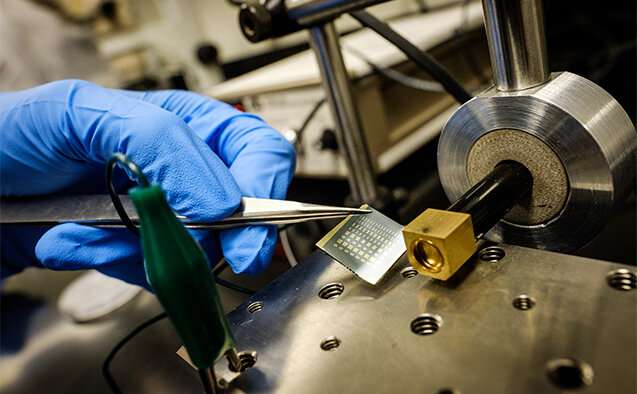A new pathway to stable, low-cost, flexible electronics

Imagine a foldable smartphone or a rollable tablet device that is powerful, reliable and, perhaps most importantly, affordable.
New research directed by Wake Forest University scientists and published today in the journal Nature Communications has led to a method for both pinpointing and eliminating the sources of instability in the materials and devices used to create such applications.
"In this work, we introduced a strategy that provides a reliable tool for identifying with high accuracy the environmental and operational device degradation pathways and subsequently eliminating the main sources of instabilities to achieve stable devices," said lead author Hamna Iqbal, a graduate student who worked closely with Professor of Physics Oana Jurchescu on the research.
Device stability has remained one of the biggest challenges in flexible organic electronics, keeping potentially life-changing inventions—smart bandages that monitor the healing of an injured arm, flexible transparent solar cells, or smart tablets that roll up conveniently into a pen—both expensive and often stuck in the prototype stage.
Jurchescu, who studies the science underlying flexible electronics, said the findings could bolster the scope and effectiveness of many real-world applications that can contribute to the Internet of Things.
"You can place these devices on almost anything, on plastic for rollable displays, in conformal biomedical applications, and on fabric for wearable electronics," she said. "Because we can now make them at a lower cost, we can think about electronic devices and capabilities we haven't thought about before, that will enhance the quality of our lives, and address major challenges like sustainability and environment."
For instance, Jurchescu's lab has been working with the Wake Forest School of Medicine to design a device similar to human tissue that can detect radiation levels during cancer therapy.
The Nature Communications article explaining the new research, "Suppressing bias stress degradation in high performance solution-processed organic transistors operating in air," tested organic field-effect transistors, which are the basic units for displays and integrated circuits. Iqbal used transistors of various compositions and configurations to replicate voltage-driven display technologies, like those found in smartphones and tablets. Typically, such technologies degrade over time when voltage is applied during continuous operation.
But when using the pathway, the Wake Forest scientists designed to keep the transistors stable, the devices consistently remained stable, with threshold voltage shifts staying as low as 0.1 volts.
This discovery could help many flexible electronics applications move from prototype to reality, Jurchescu said.
"We addressed an important question, which, in addition to enhancing the technological appeal, also helped us to understand the physics of organic devices," she said. "Our science allows others to develop more reliable products, better products."
More information: Andrew M. Zeidell et al. Organic Field‐Effect Transistors as Flexible, Tissue‐Equivalent Radiation Dosimeters in Medical Applications, Advanced Science (2020). DOI: 10.1002/advs.202001522
Hamna F. Iqbal et al. Suppressing bias stress degradation in high performance solution processed organic transistors operating in air, Nature Communications (2021). DOI: 10.1038/s41467-021-22683-2


















